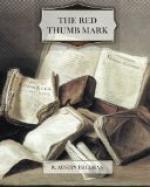“About three-quarters of an hour.”
“Who gave you the note and the parcel?”
“Mr. Walter Hornby.”
“When did he give them to you?”
“He gave them to me just before I started, and told me to go at once for fear the place should be closed before I got there.”
“And was the place closed?”
“Yes. It was all shut up, and everybody had gone.”
Anstey resumed his seat, the witness shuffled out of the box with an air of evident relief, and the usher called out, “Henry James Singleton.”
Mr. Singleton rose from his seat at the table by the solicitors for the prosecution and entered the box. Sir Hector adjusted his glasses, turned over a page of his brief, and cast a steady and impressive glance at the jury.
“I believe, Mr. Singleton,” he said at length, “that you are connected with the Finger-print Department at Scotland Yard?”
“Yes. I am one of the chief assistants in that department.”
“What are your official duties?”
“My principal occupation consists in the examination and comparison of the finger-prints of criminals and suspected persons. These finger-prints are classified by me according to their characters and arranged in files for reference.”
“I take it that you have examined a great number of finger-prints?”
“I have examined many thousands of finger-prints, and have studied them closely for purposes of identification.”
“Kindly examine this paper, Mr. Singleton” (here the fatal leaflet was handed to him by the usher); “have you ever seen it before?”
“Yes. It was handed to me for examination at my office on the tenth of March.”
“There is a mark upon it—the print of a finger or thumb. Can you tell us anything about that mark?” “It is the print of the left thumb of Reuben Hornby, the prisoner at the bar.”
“You are quite sure of that?”
“I am quite sure.”
“Do you swear that the mark upon that paper was made by the thumb of the prisoner?”
“I do.”
“Could it not have been made by the thumb of some other person?”
“No; it is impossible that it could have been made by any other person.”
At this moment I felt Juliet lay a trembling hand on mine, and, glancing at her, I saw that she was deathly pale. I took her hand in mine and, pressing it gently, whispered to her, “Have courage; there is nothing unexpected in this.”
“Thank you,” she whispered in reply, with a faint smile; “I will try; but it is all so horribly unnerving.”
“You consider,” Sir Hector proceeded, “that the identity of this thumb-print admits of no doubt?” “It admits of no doubt whatever,” replied Mr. Singleton.
“Can you explain to us, without being too technical, how you have arrived at such complete certainty?”
“I myself took a print of the prisoner’s thumb—having first obtained the prisoner’s consent after warning him that the print would be used in evidence against him—and I compared that print with the mark on this paper. The comparison was made with the greatest care and by the most approved method, point by point and detail by detail, and the two prints were found to be identical in every respect.




